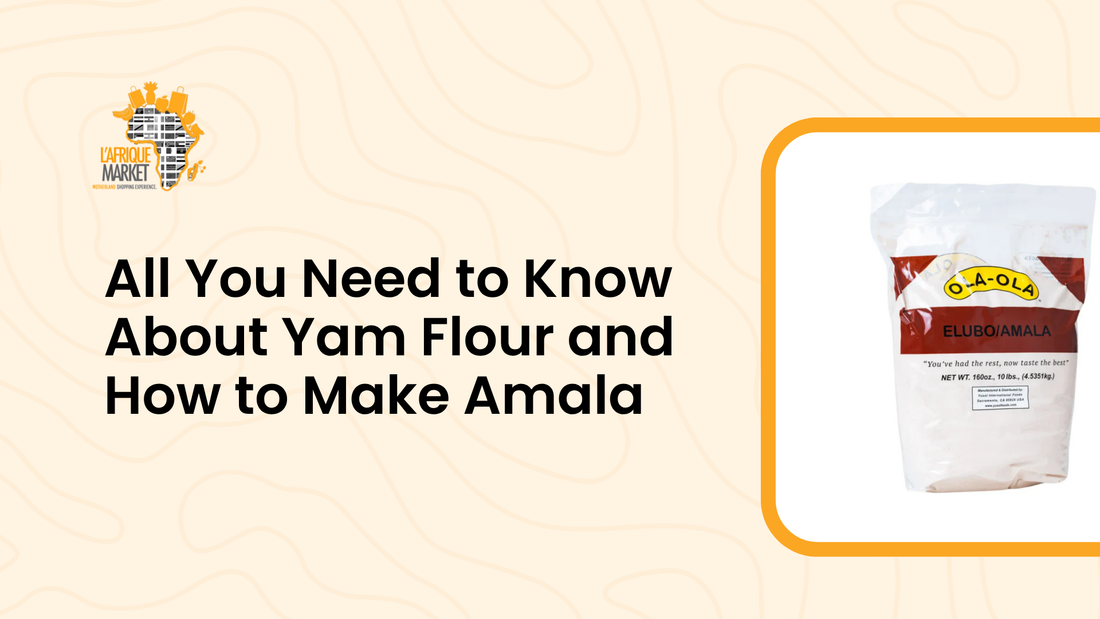
All You Need to Know About Yam Flour and How to Make Amala
Share
There’s something deeply nostalgic about a warm plate of Amala and Gbegiri. If you grew up in a Yoruba household or visited one, you probably remember the dark brown doughy “swallow” that always seemed to melt into rich, velvety soups. That’s Amala — made from Elubo, or yam flour.
But Elubo isn’t just any flour. It’s the result of a thoughtful, time-intensive process that transforms whole yams into one of West Africa’s most beloved staples. If you've ever wondered what exactly Elubo is, how it's made, and how to turn it into authentic Amala, this blog breaks it all down.
Let’s get into it.

Also Read: How to Make Seafood Okro Soup and The Ingredients You Need.
What Is Elubo (Yam Flour)?
Elubo is a type of flour made by peeling, slicing, drying, and grinding yams — typically the white yam (Dioscorea rotundata). It’s commonly used in Yoruba cuisine in Nigeria to make Amala, a swallow dish known for its earthy taste and soft, stretchy texture.
Elubo is different from:
- Poundo yam: Instant yam flour that mimics pounded yam
- Water yam flour: Different yam varieties with a more slippery texture
- Cassava flour (lafun/fufu): Made from fermented cassava
Elubo stands out because of its distinctive dark brown color, which comes from sun-drying the yam slices before grinding.

Image from: Agriculture Nigeria
Origin and Cultural Significance
Elubo is primarily used among the Yoruba people of Southwestern Nigeria, where Amala is more than just a food — it’s a cultural identity. In traditional Yoruba gatherings, naming ceremonies, or Sunday family meals, Amala often steals the show, served with:
- Gbegiri (bean soup)
- Ewedu (jute leaf soup)
- Obe ata (pepper stew)
- Ogbono or Egusi soup
Beyond Nigeria, Elubo is also appreciated in Benin, Togo, and Ghana, where similar yam-processing methods are used.

How Is Elubo Made? (Traditional Method)
The process of making Elubo from yam is labor-intensive but beautifully rooted in tradition.
Step 1: Select and Wash Yams
Usually white yam varieties are selected for their starch content and ability to ferment slightly. They're washed to remove dirt and debris.
Step 2: Peel and Slice
Yams are peeled and cut into thin slices. This helps them dry faster and more evenly.
Step 3: Sun-Dry
Slices are sun-dried for several days. This is what gives Elubo its unique brown color. Some households lightly ferment the yams before drying to enhance flavor.
The drying phase is critical — it removes moisture and adds depth of taste.
Step 4: Grind into Flour
Once fully dried, the yam slices are ground into a fine powder using stone mills or commercial grinders. The flour is then sifted and stored in airtight containers.
At L’Afrique Market, our Elubo is carefully sourced and processed to retain its rich flavor, just the way it’s made at home.
How to Make Amala with Elubo (Step-by-Step)
Making smooth, lump-free Amala is an art, but once you get the hang of it, it becomes second nature.
What You’ll Need:
- 1 cup Elubo (yam flour)
- 2.5 cups water (adjust as needed)
- Wooden spatula (omorogun)
- Saucepan or pot
Steps:
-
Boil Water
Bring the water to a boil in a clean pot. -
Gradually Add Elubo
Lower the heat. Using one hand, slowly pour in the Elubo while stirring vigorously with the other. Keep stirring to prevent lumps. -
Stir Until Thickened
Stir in circles and fold continuously until the mixture becomes thick and stretchy. -
Steam and Cover
Cover the pot for 1–2 minutes to allow it to steam, then stir again to smooth it out. -
Serve Hot
Scoop into portions and pair with your favorite soup.
Popular Soups to Pair with Amala
Amala loves rich, bold soups — here are some classics:
- Gbegiri: A smooth yellow soup made from peeled black-eyed beans
- Ewedu: A slimy, nutrient-rich soup made from jute leaves
- Obe Ata: Spicy, red pepper sauce with assorted meat
- Ogbono Soup: Thick and slippery, perfect for swallow
- Egusi: Nutty melon seed soup with vegetables and meat
Health Benefits of Elubo
Yam flour isn’t just delicious — it’s good for you too:
- Rich in fiber: Aids digestion
- Complex carbs: Provide sustained energy
- Gluten-free: Great for people with sensitivities
- Iron & potassium: Good for blood and nerve health
- Low glycemic index: Supports blood sugar regulation
Where to Buy Authentic Elubo
You don’t need to travel to Nigeria to get your hands on high-quality yam flour. At L’Afrique Market, we stock authentic Elubo that’s:
- Sun-dried
- Finely ground
- Packaged for freshness
We also offer:
- Ogbono seeds
- Crayfish
- Palm oil
- Ewedu leaves (dried)
- Assorted meats and proteins to go with your soup
👉 Shop the full collection here:
Shop Elubo and Swallow Essentials →
Tips for Cooking and Storage
- Storage: Keep your Elubo in a cool, dry place. Use airtight jars or ziplock bags to prevent moisture and bugs.
- Portion control: Measure carefully — a little goes a long way.
- Texture fix: If it turns out too thick, add hot water and stir until smooth. If too soft, sprinkle a little more Elubo.
Final Thoughts: A True Taste of Home
Elubo is more than a flour. It’s a flavor of tradition, a symbol of West African pride, and a comforting dish that brings families together. Whether you're reliving your childhood or exploring new tastes, making Amala at home is a delicious way to stay connected to your roots.
And when you're ready to stock your kitchen the African way, L’Afrique Market is here with everything you need — from Elubo to egusi, and everything in between.
